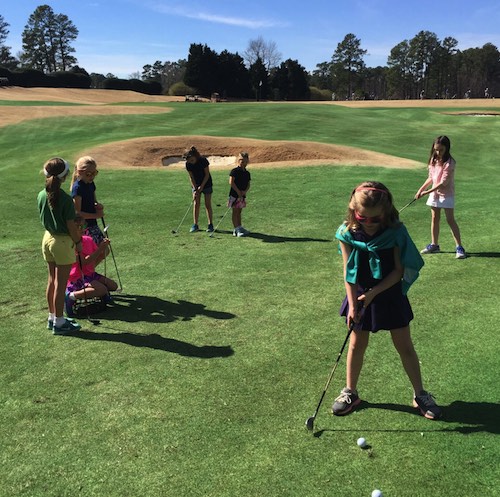
Junior Golf thrives at Raleigh Country Club
Jim Barnes has been around the junior golf program at Raleigh Country Club since 1973, when he was four-years-old and playing golf with his father. Today his own sons, Avery and Camden, are active in the RCC junior golf program, and Barnes says things have changed quite a bit since he was a kid.
“When I was growing up, there were only about three junior golfers,” he recalls. “I played golf with more retired members during the weekdays than young people. Nowadays at the parent-child tournaments, you’ll have 60 teams.”
Involvement in RCC’s junior golf program, led by Assistant Golf Pro Thomas Walker, has skyrocketed. Walker and his staff host a variety of events during the year, including fall and spring after-school clinics and summer camps, and they’ve fielded numerous successful PGA Junior League teams in the past few years.
LAYING THE GROUNDWORK
Growing the junior golf program was a top priority for McConnell Golf after taking ownership of RCC in 2003. McConnell wanted to emulate the vibrant programs at nearby clubs in Raleigh. A key hire at RCC was Josh Points, who came from Florida, where he was teaching with famed instructor Jim McLean.
“We wanted to follow a pyramid model — growing a big base with beginners, then moving them to intermediate and advanced, then on to high school and college,” says Brian Kittler, RCC’s director of golf operations. “We knew we had the facilities and the instruction to do so.”
Mission accomplished: RCC’s junior golf program is now regularly churning out college golfers, starting a few years back with Cyrus Stewart, who went on to play at Wake Forest and is now pursuing professional golf. Stephen Franken is at NC State now, earning All-ACC honors this past season. Preston Ball (Loyola), Gray Matthews (Sewanee), and Sam Stephenson (UNC Pembroke) have all played collegiate golf, while Parker Gillam is headed to Wake Forest this fall.
“That progress has been really cool to see,” says Kittler. “We’ve grown quite a pipeline. Every graduating class now sends kids to Division I golfing programs. I think we’ve created a culture. Plus, they’re all really great kids.”
FUNDAMENTALS AND MORE
Eleven-year-old Kinsley Smith, a fifth grader at Lacy Elementary, has participated in just about everything offered at RCC at every level during the past few years.
“I remember Kinsley not being able to get the ball airborne two years ago,” says Walker. “Now, she’s one of the best on our Junior League team. She whooped all the boys a few nights ago.”
“She’s really improved. It’s been exciting to see,” says Marcus Smith, Kinsley’s father. “More than anything, it’s the opportunities. They’ve really expanded the program. They’ve added a Saturday series, the summer camps, which have been really good, and they’ve added fall events like they’ve done in the spring. The more you’re out there playing and practicing, the better you’re going to get. It’s fun for her. Golf is an individual game, but the team-based atmosphere, the camaraderie at the camps, and the spring and fall drills ... it makes it fun for the kids.”
Kinsley has now started playing tournaments, including U.S. Kids Golf and she recently started playing in Peggy Kirk Bell Girls Tour events around North Carolina. She’s tried other sports too — dance, gymnastics, and tennis, plus other activities — but according to her father: “She keeps coming back to golf. Now it’s just part of our after-school routine.”
Smith says the RCC staff, along with its world-class facilities, has been key to Kinsley’s rapid improvement.
“Raleigh Country Club has got to have one of the best practice facilities anywhere,” he says. “If you can learn to chip and putt at Raleigh, that game will travel. When you see 30 kids on the putting green, to me that’s awesome. It’s a game of a lifetime. It’s a good gift to give a kid.”
Barnes adds that the lessons taught by Walker and the rest of the RCC team impact young people in ways far more important than just golf.
“They’re focusing on the fundamentals, but they’re also focusing on what we want all young people to learn — to be good teammates, to pull for each other, to be good stewards of the game,” he says. “Winning is secondary. They’re good golfers, but they’re good young people first and foremost. Not all of them are going to be professional golfers, but they’re all going to be adults one day.”